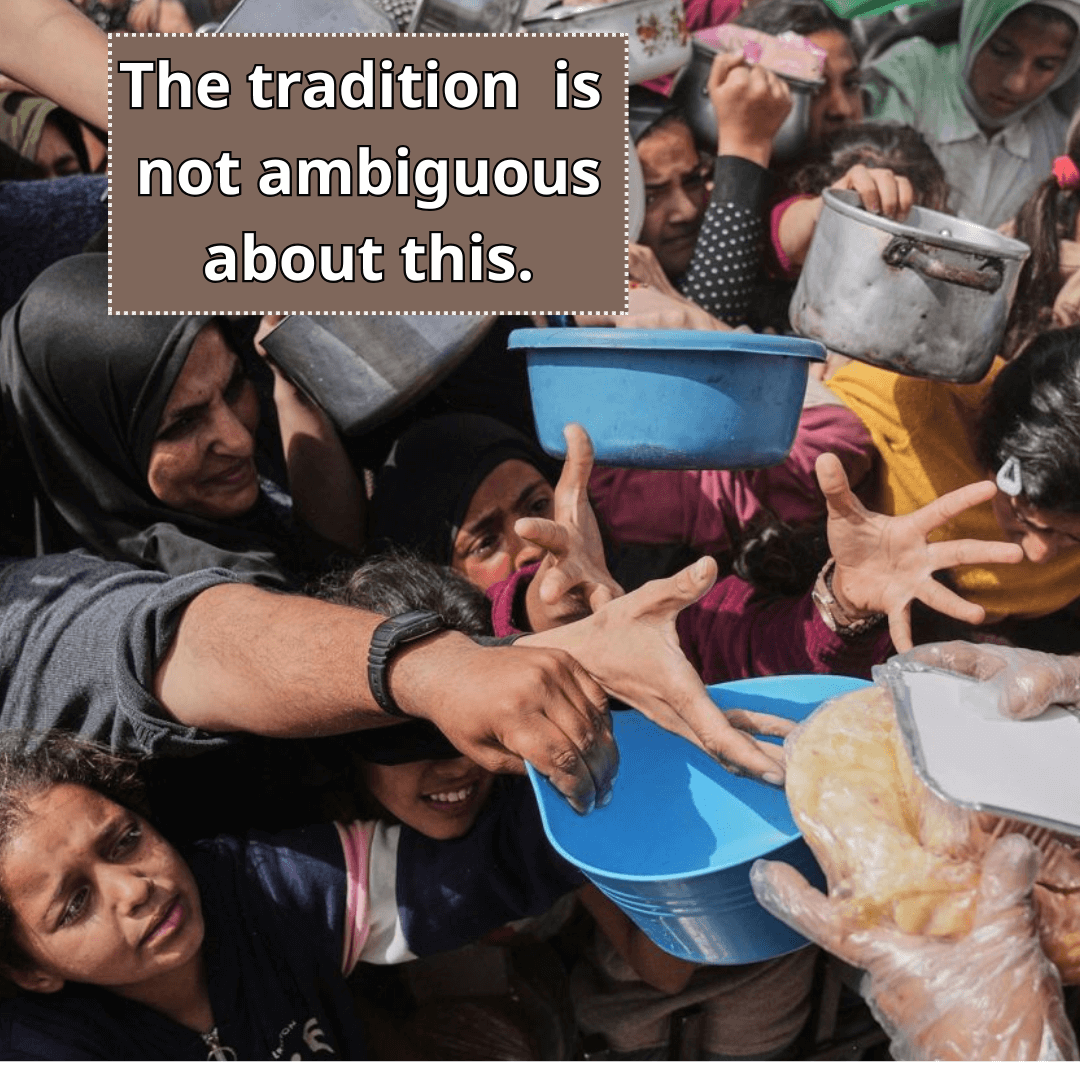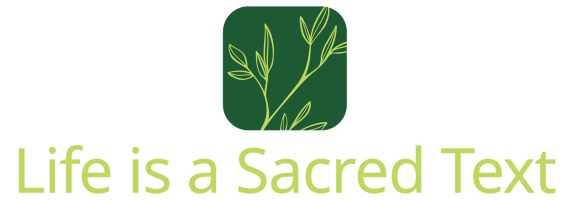to Jews, on the Gaza famine
an open letter: we have been commanded

This is Life as a Sacred Text 🌱, an everybody-celebrating, justice-centered voyage into ancient stories that can illuminate our own lives. It‘s run on a nonprofit, so it’s 100% NAZI FREE. More about the project here, and to subscribe, go here:
My beloved fellow Jews. Yidden. Hevre.
Please, can we talk?
Whether you feel conflicted, because even as you acknowledge the dire situation in Gaza, you're concerned that opening access to aid could allow weapons to be smuggled in that could also have consequences on the scale of mass death–
(as I've heard a few times on social media in the last days– )
Whether you might be nervous about speaking out in places where you might be able to have some impact–
Whether you might have hesitated to take action so far–
Whether or not that's because you're concerned that acknowledging the gravity of the situation could give ammo to antisemites–
Please:
At least read this, OK?
Nearly 100,000 women and children are suffering from severe acute malnutrition, and a third of Gaza’s population is going days without eating, according to Ross Smith, the U.N. World Food Program's director for emergencies.
43 people have died of malnutrition in the past week, most of them children.
And that the share of children suffering from severe malnutrition has jumped from 2.4 percent in February to 8.8 percent in the first two weeks of July.
We have Rabbinic terms for parsing some of your concerns: It is a matter of a safek/uncertain case versus a vedai/the certain case.
That is to say: It's possible that weapons might get smuggled in.
It's possible that– well, a lot of things are possible.
It's a certainty, an absolute objective fact that children are dying now.
Our refusal to look at the basics of Rabbinic logic underscore the same fact, again and again:
The Jewish people have moral frameworks for this moment.
It is a choice not to heed them.
The principle of saving lives is so important that one can not only violate Shabbat to do so, but one who is vigilant– who acts quickly to help– is called "praiseworthy." (Talmud Yoma 84b)- The whole reason (Talmud Bava Batra 8b) that redeeming hostages is such an urgent mitzvah is because it includes the risks of famine and death– horrors which must be avoided at all costs.
- Our most authoritative law code says explicitly, in clear language, that if someone is hungry, you must feed them. (Shulchan Arukh, Yoreh De'ah 250:1)
It's never been ambiguous.
Rabbi Jill Jacobs, CEO of T'ruah: The Rabbinic Call for Human Rights wrote yesterday,
In private, I’ve heard many Jewish leaders and even more Jewish community members acknowledge their horror at what is happening in Gaza and the worsening onslaught of settler violence in the West Bank.... But in public, most of the current mainstream leadership presents a united front in which no criticism of the Israeli government or military will be tolerated.
And yet, more and more Israelis are demonstrating. The vast majority of the nation is desperate to end the war as soon as possible. More people are refusing to serve in the army.
Haaretz' lead editorial today– published on behalf of the whole editorial staff— begins, in clear language,
Gaza is starving, and Israel is responsible.
David Horovitz, the founder of the Times of Israel, just wrote a piece titled, "How Israel made itself responsible for Gaza, and for all the death, hunger and destruction there."
We in galut, diaspora, must be willing to be as clear-eyed.
We must meet this moment as the people we are supposed to be. We must show up in integrity. Everything else flows from that.
Do you not hear Heschel? Heschel who couldn't pray because he kept thinking about children being napalmed?
Rabbi Abraham Joshua Heschel wrote,
“Morally speaking, there is no limit to the concern one must feel for the suffering of human beings. Indifference to evil is worse than evil itself, [and] in a free society, some are guilty, but all are responsible.”
We are past the time time, my friends, that history has called for us, specifically, to rise to our obligations.
Jews of every kind and stripe and flavor and background, please. Every human of every kind, please. And most certainly "us," my colleagues and comrades-in-arms: rabbis and cantors and executive directors and program professionals and comms people and everybody connected to any synagogue or community or any anything, Jews, my people.
This cannot be our moment for silence. It. Cannot.
Please let us rise to meet this moment and see the shattered Temple around us, right now, and our responsibility to it.
In nine days we will sit on the floor and we will weep,
"Alas! Lonely sits the city
Once great with people!
She that was great among nations
Is become like a widow;" (Lamentations 1:1)
Who will we weep for? What will we weep?
Who will we think of when we sing of the people who "sigh and search for bread," who have "bartered their treasures for food" (Lamentations 1:11), of the children asking their parents for food and dying in the city squares? (Lamentations 2:11-12?)
Let us meet this moment now. Right now.
Because if we don't– in fifty-nine days we will, what? Stand before God and ask God to forgive us?
Forgive us for –
For the children we have let die of hunger out of –
Can you stand before God and tell God coherent reasons why we let children die of hunger?
Do you have such audacity? I don't.
We are consistently commanded to prioritize care for those most marginalized – the widows, the orphans, the non-Jews who dwell in our midst.
We have been told to love our neighbor as ourselves– the greatest commandment, if you ask Rabbi Akiva.
Please, I beg you. If you have not: Go look at some real footage of those starving children, please go educate yourself about what is actually happening on the ground to the human beings happening there, and tell me that the uncertainty of a possibility takes precedence over the willful killing of children.
Please, I beg you. Our God commands us not to feed children to Molech. How could this be the Divine Will?
For me– well, my own theology is a longer conversation, but the moral stakes aren't.
Our obligations in this moment seem quite straightforward to me, frankly.
If you have any positional power whatsoever in the Jewish community– in an org, at a school, in a shul, on a board, in a rabbinic association, anywhere: Use it to demand that your community speak up and push towards political power.
Call your Senator and reps. (202) 224-3121
Our Rabbis taught, “Give sustenance to the poor of the non-Jews along with the poor of Israel. Visit the sick of the non-Jews along with the sick of Israel. Bury the dead of the non-Jews along with the dead of Israel. [Do all these things] because of the ways of peace.” (Talmud Gittin 61a)
“If a poor person asks for food and you do not give it to them, you are violating the mitzvah, 'Do not harden your heart and do not close your hand,’ (Deuteronomy 15:7)... You must immediately give them what they need.” (Maimonides, Mishneh Torah, Gifts to the Poor 7:2)
Do not stand by the blood of your neighbor;
I am God.
(Leviticus 19:16)
🌱❤️
A note on the subscription model:
I want my work to be as accessible to as many people as possible, in as many ways as possible. That's why the Monday essays are free, and why we donate subscriptions to anyone for whom paying is a barrier to the House of Study posts.
I also believe people should be paid fairly for their work. Needless to say, these two values sometimes seem to be in conflict, but I do what I can to find a fair balance. I offer many resources for free, and charge for others. When you donate generously or pay at the top of our scale, that helps support the work I do, provides access for those who have fewer resources, pays for the infrastructure and the technical and practical support that it takes to do this, and helps us keep the work sustainable.
And as always, if you want in to the Thursday space but paying isn't for you now, just email support@lifeisasacredtext.com and we'll hook you up.
And if you’d like to underwrite one of these donated subscriptions, you can do so by signing up at one of the higher subscription points.
And if it resonated with you, please share this post.
Sending a big pile of blessings and goodness your way. 💕




